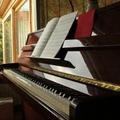Música, termos técnicos
|Termes techniques musicaux|
music|terms|technical
|Begriffe|
Musik, Fachbegriffe
Music, technical terms
Música, términos técnicos
Musique, termes techniques
Musica, termini tecnici
音楽、専門用語
음악, 전문 용어
Musik, tekniska termer
音乐、技术术语
Recentemente conheci um rapaz pela internet que toca instrumentos de percussão, como pandeiro, tamborim e bumbo.
Récemment|j'ai rencontré||un garçon||internet||joue|des instruments|de percussion|percussion||tambourin brésilien|tambourin||grosse caisse
recently|met||guy|through the|internet|||instruments||percussion instruments||tambourine|Tambourine drum||bass drum
kürzlich||||||||||Schlaginstrumente||Pandeiro|Tamburin||Bass drum
||||||||||instrumenty perkusyjne||tamburyn|tamburyn||bęben basowy
||||||||||打楽器||パンデイロ|タンバリン||バスドラム
|conocí a||||||||||||||bombo
Vor kurzem habe ich online einen Mann kennengelernt, der Schlaginstrumente wie Tamburin, Tamburin und große Trommel spielt.
I recently met an internet boy who plays percussion instruments, such as tambourine, tambourine and bass drum.
Ele toca numa banda militar.
|joue||fanfare militaire|militaire
He plays in a military band.||in a|band|military
|||Band|
||||wojskowy
Er spielt in einer Militärkapelle.
He plays in a military band.
Quando ele descobriu, que eu também toco um instrumento, ele ficou muito empolgado, pois ele queria aprender a dizer alguns termos técnicos em português.
||a découvert||je||joue||instrument||était||très enthousiaste|||||à|||termes techniques|techniques||portugais
||discovered||||play||||got excited||excited|because||wanted|||to say|some|technical terms|technical||
||entdeckte||ich||||||||begeistert|||||||||||
||||||||||||Podekscytowany||||||||terminy techniczne|terminy techniczne||
||||||||||||興奮した||||||言う|||||
||||||||||||emocionado|||||||||||
Als er erfuhr, dass ich auch ein Instrument spiele, war er sehr aufgeregt, denn er wollte lernen, wie man einige Fachbegriffe auf Portugiesisch sagt.
When he discovered that I also played an instrument, he was very excited because he wanted to learn to say some technical terms in Portuguese.
Quand il a découvert que je jouais aussi d'un instrument, il était très enthousiaste parce qu'il voulait apprendre à utiliser des termes techniques en portugais.
Termos como partitura, oitava, escala, nota, bemol, sustenido, bequadro, pausa, clave, clave de Fá, clave de Sol, entre outros.
||Partition musicale|octave|gamme|note|bémol|dièse|bécarre|pause (1)|clef|||Fa|||clé de Sol||
terms||Sheet music|octave|scale|note|flat note|Sharp note|natural sign|rest|clef|clef (2)||F clef|treble clef||G|among|others
||Partitur|Oktave|||B-moll|Kreuznote|||||||||||
||nuty|oktawa|skala muzyczna|nuty|bemol|krzyżyk (dźwięk)|kasownik przywracający dźwięk|pauza|klucz muzyczny|||klucz basowy|||Klucz wiolinowy||
||楽譜|オクターブ|音階|音符|変ロ|シャープ|フラット|休符|音部記号|鍵||ファ|鍵||ソル音||
||||||||becuadro||||||||||
Begriffe wie Partitur, Oktave, Tonleiter, Note, flach, scharf, Bequadro, Pause, Schlüssel, Bassschlüssel, Violinschlüssel und andere.
Terms such as score, octave, scale, note, flat, sharp, bequadro, pause, clave, clave de F, clave de Sol, among others.
Acho que a maior diferença entre inglês e português é o nome das notas.
||la||différence||||portugais|||||les notes
I think|||largest|difference||||||||of the|grades
|||||||||||||音符
Creo|||||||||||||
Ich denke, der größte Unterschied zwischen Englisch und Portugiesisch ist die Bezeichnung der Noten.
I think the biggest difference between English and Portuguese is the name of the notes.
Enquanto em inglês as notas se chamam A, B, C, D, E, F e G, em português ela se chamam Dó, Ré, Mi, Fá, Sol, Lá, Si.
||||notes|se||A (1)||C(1)|||Fa||Sol||portugais||s'appellent||Do|Ré|Mi|Fa|||
While||||||are called||||||||||||||C|Re|E||||
|||||||||||||||||||||Re|Mi||||
Während die Noten im Englischen als A, B, C, D, E, F und G bezeichnet werden, heißen sie im Portugiesischen C, D, E, F, G, A, B.
While in English the notes are called A, B, C, D, E, F and G, in Portuguese they are called C, R, M, F, Sun, Y, Si.
Então uma peça pode ser em Dó maior (C major) , em Lá sustenido menor (A#m), em Si bemol maior (B♭ major) e assim por diante.
||pièce musicale|||||||majeur||||||mineur||||||||||et ainsi de suite
||piece|||||||major||A sharp|A sharp|||||||||||so on||and so on
|||||||||Dur|||||||||||||und so weiter|||und so weiter
||曲||||||||||シャープ||||||変ホ|||||そのように||
||utwór muzyczny||||||||||krzyżyk|||||||||||||i tak dalej
So kann ein Stück in C-Dur (C-Dur), in ais-Moll (A#m), in B-Dur (B♭-Dur) und so weiter stehen.
Then a piece can be C major, C minor A, C major B, and so on.
Ensuite, un morceau peut être en ut majeur, en ut mineur, en ut majeur, etc.

